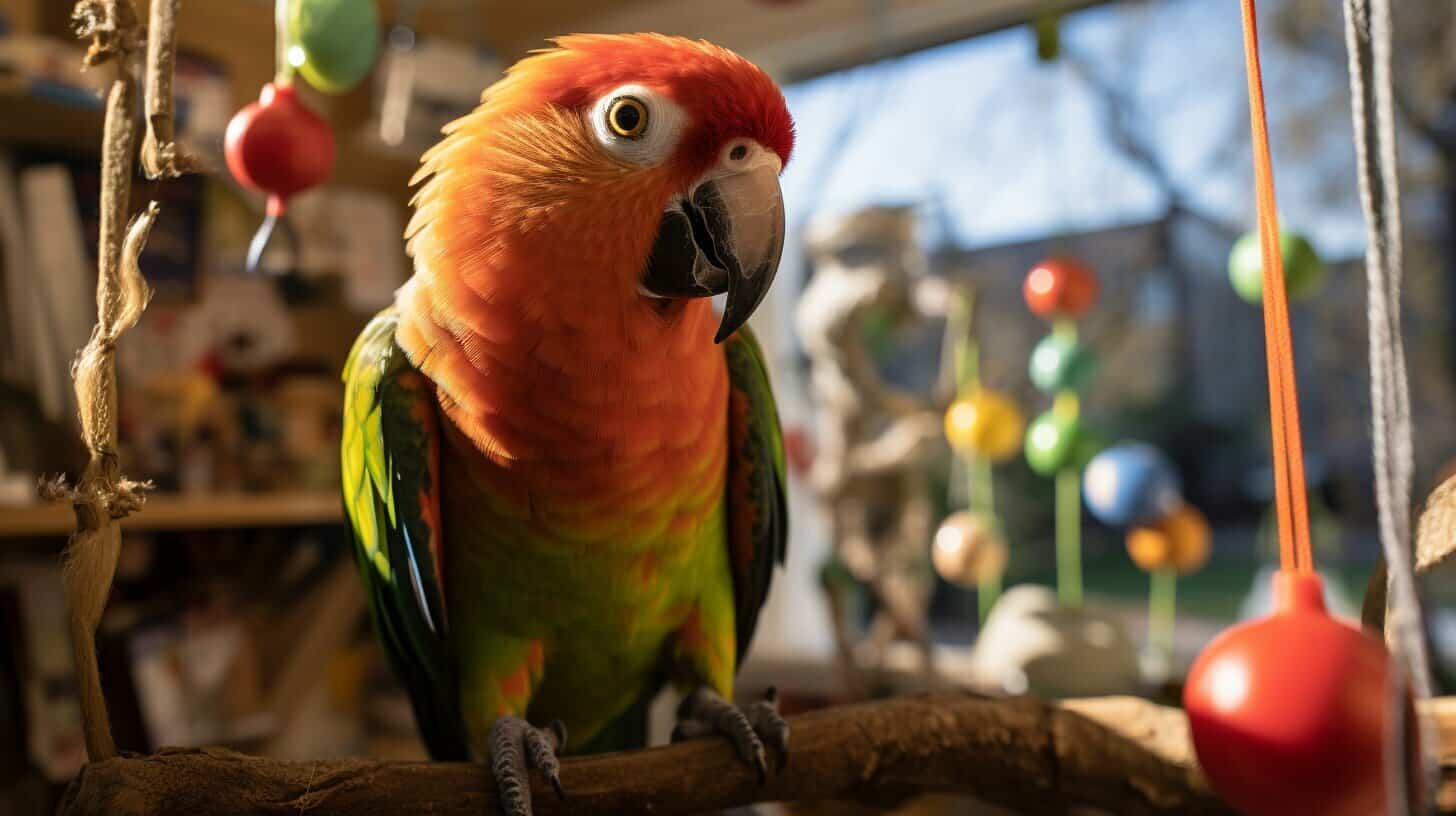Kakarikis are a beloved bird species known for their playful personalities and vibrant feather colours. One of the most remarkable abilities of these birds is their talking skills. However, many owners may wonder at what age do Kakarikis talk.
According to bird experts, the timing of when a kakariki starts talking can vary widely and depends on various factors, including genetics, socialisation, and environment.
Key Takeaways:
- Kakarikis are known for their impressive talking abilities.
- The age at which they start speaking can vary widely.
- Various factors, including genetics, socialisation, and environment, can influence a kakariki’s talking abilities.
Understanding Kakariki Parrot Speech Development
Kakarikis are highly intelligent birds, capable of learning and mimicking human speech to a certain extent. However, various factors affect their speaking capacity, including genetics, environment, and training.
The speech development process in kakarikis is gradual, with birds going through several stages before they start talking. For instance, they begin by making chattering sounds, which can evolve into short phrases or words.
Research has shown that the ability to talk in Kakariki is largely influenced by genetics. Some birds are more predisposed to talking than others, which can be traced back to their genetic makeup.
Nevertheless, environmental factors such as socialisation and training significantly impact the talking abilities of kakarikis. Birds exposed to more human interaction and speech are likely to talk more than those kept in isolation.
Training, in particular, is essential in enhancing vocal development in kakarikis. Using positive reinforcement, owners can encourage their birds to repeat certain words or phrases, gradually building their vocabulary.
Stages of Speech Development in Kakarikis
The following are the typical stages of speech development in Kakarikis:
- Noise-making: This is the stage where the bird makes noise by chattering, squawking, or whistling.
- Babble: At this stage, the bird starts experimenting with sound combinations and makes noises that sound like words.
- Short phrases: The bird can now say simple phrases like “hello” or “goodbye.”
- Long phrases: The bird’s vocabulary expands to include longer phrases and sentences.
It’s important to note that not all kakarikis will progress through these stages at the same rate. Some birds may skip certain stages or take longer to develop their speech abilities.
In the next section, we will explore the various factors that can influence the talking abilities of kakarikis.
Factors Affecting Kakariki’s Talking Abilities
Like other parrots, Kakarikis can mimic human speech, but the extent to which they can develop this skill depends on various factors. Here are some key factors that can impact the speaking ability of kakarikis.
| Factor | Description |
|---|---|
| Genetics | The genetic makeup of a Kakariki can affect its speech development. Some Kakarikis may have a natural aptitude for speech, while others may not. |
| Environment | At a young age, Kakarikis exposed to different sounds and voices tend to have better speech development. Interacting with other Kakarikis can also facilitate vocal learning and communication skills. |
| Socialization | At a young age, Kakarikis exposed to different sounds and voices tend to have better speech development. Interacting with other Kakarikis can also facilitate vocal learning and communication skills. |
| Training | Training is a critical factor in the speech development of kakarikis. The amount and quality of training they receive can significantly affect their ability to mimic human speech. |
While genetics and environment can play a role, socialisation and training are the two primary factors owners can influence. Proper training, socialisation, and interaction with humans can go a long way in enhancing the talking ability of kakarikis.
Encouraging Vocal Development in Kakarikis
If you’re wondering when kakarikis start talking, it’s important to note that it can vary from bird to bird. However, there are several steps you can take to encourage vocal development in your kakariki parrot.
Talk to Them Regularly
One of the most effective ways to encourage your kakariki to talk is by talking to them regularly. Engage in conversations with your bird and use simple words or phrases that can be repeated easily. Maintaining a friendly and positive tone is essential to make them feel comfortable and encouraged.
Use Positive Reinforcement
Positive reinforcement is a powerful tool for teaching new behaviours to animals. When your bird tries to mimic human speech, reward them for their efforts with treats, praise, or head scratches. Positive reinforcement will encourage your kakariki to continue trying and improving their talking abilities.
Provide Toys and Enrichment
Kakarikis are intelligent birds that require mental and physical stimulation to thrive. Provide them with toys, puzzles, and other forms of enrichment to keep them engaged and entertained. This will improve their cognitive abilities and enhance their vocal development.
Create a Stimulating Environment
Finally, creating a stimulating environment encourages vocal development in kakarikis. Please provide them with a spacious, comfortable cage, natural light, and access to fresh air. Additionally, playing soft background music or nature sounds can help create a soothing environment for your bird to practice their speech.
Common Challenges in Kakariki Talking Abilities
A common challenge owners may face when attempting to train their kakarikis to talk is that not all birds will start talking at the same age. Some birds may take longer to develop their speaking abilities, while others may not talk at all. This is normal and is due to a variety of factors that may be influencing their development.
One of the main factors that can affect a kakariki’s talking abilities is their personality and temperament. Some birds may be more reserved and less likely to vocalise, while others may be highly social and talkative. Additionally, the environment in which a bird is raised can also impact its development. A lack of socialisation or exposure to new sounds and stimuli can hinder a bird’s ability to learn and mimic human speech.
Genetics
The genetic makeup of a Kakariki can also play a role in their speaking abilities. Some birds may be predisposed to better verbal skills due to their genetic makeup, while others may struggle with developing their speech regardless of their training efforts.
Age and Health
The age and health of a Kakariki can also influence their speaking abilities. Younger birds may take longer to develop their speech than older birds, and unwell or stressed birds may struggle with learning new skills.
Owners must be patient and persistent in training their kakarikis to talk. Consistent training, positive reinforcement, and exposure to new sounds and stimuli are all key factors in encouraging vocal development. Additionally, owners should ensure that their birds are healthy and living in an environment that promotes their well-being to maximise their potential for success.
Tips for Training Your Kakariki to Talk
Training your kakariki to talk can be an exciting and rewarding process. Here are some tips to help encourage your feathered friend’s vocal development:
- Repeat yourself: Repeat words and phrases consistently to help your kakariki learn and mimic them. Start with simple words and gradually increase the complexity of the phrases.
- Use clear, distinct words: Speak slowly and clearly so your kakariki can hear and understand the sounds you are making. Focus on one word or phrase at a time and use repetition to reinforce it.
- Imitate their natural sounds: Kakarikis use a range of natural sounds for communication. Try imitating these sounds to encourage them to mimic you in return. For example, mimic your kakariki’s chirps or whistles and see if they copy you.
- Positive reinforcement: Reward your kakariki with treats, toys or attention when they try to talk. This reinforces their behaviour and encourages them to keep trying.
- Be patient and consistent: Training your kakariki to talk can take time and effort. Be patient and consistent with your training, and don’t get discouraged if progress is slow. Consistent training sessions, even just a few minutes a day, can add up over time.
Remember, not all kakarikis will talk, and some may take longer than others to begin. Keep in mind that the age at which they start talking can vary, and some may never develop the ability to mimic human speech. However, with patience, persistence and positive reinforcement, you can help your kakariki reach their full potential.
Conclusion
To conclude, the age at which kakarikis start talking can vary from bird to bird, depending on several factors such as genetics, environment, socialisation, and training. While some kakarikis may start talking as early as 3 to 4 months, others may take up to a year or longer to develop their speech. Owners must be patient and persistent in encouraging vocal development in their kakarikis.
Owners can help their kakarikis develop their speech and mimic the sounds they hear by providing a stimulating environment, regular socialisation, and positive reinforcement. It is also crucial to remember that some birds may not start talking, which is perfectly normal. As with any aspect of pet ownership, it is important to respect the individuality of each bird and work with them to achieve their full potential.
FAQ
Q: What age do Kakarikis talk?
A: Kakarikis typically start talking around 6 to 12 months of age. However, it is important to note that talking abilities can vary among individual birds.
Q: Understanding Kakariki Parrot Speech Development
A: The speech development of Kakarikis occurs in stages. They initially start by making simple sounds and eventually mimic human speech. Factors such as genetics, environment, socialisation, and training can affect their ability to talk.
Q: Factors affecting Kakariki’s talking abilities
A: Various factors can influence a Kakariki’s talking abilities. Genetics play a role, as some birds may have a natural inclination for speech. The environment, socialisation with humans and other birds, and consistent training also contribute to their speech development.
Q: Encouraging vocal development in Kakarikis
A: To encourage vocal development in Kakarikis, talking to them regularly and using positive reinforcement when they make sounds is important. Providing toys and enrichment that stimulate their vocal abilities can also be beneficial.
Q: Common challenges in Kakariki talking abilities
A: It is not uncommon for some Kakarikis to take longer to start talking or not talk at all. Reasons for this can vary, including individual differences, a lack osocialisationon or training, or certain health issues. Patience and persistence are key when facing these challenges.
Q: Tips for training your Kakariki to talk
A: Training your Kakariki to talk requires patience and consistency. Repetition, using clear and distinct words, and imitating their natural sounds are effective techniques. Maintaining a positive and encouraging environment during the training process is important.



Have comments or questions about this article? Then get involved!
Spotted an error or something we have missed? Let us know